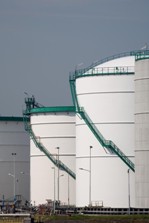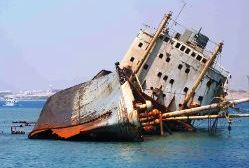| |
Issue 5 : March 2010 |
The year has started with a bang for DWA, big contracts a lot of them. Which meant Chinese New Year came and went and February ran out before we could put this newsletter to bed! Not that we have not had time to reflect on the big issues poverty, environment and shipping!
As the Northern hemisphere moves out of the winter – though the two snowfalls in two days as I passed through Hamburg a couple of days ago belies this – there is far more positive talk on the economy and the shipping industry. Some are even predicting that a mix of less tonnage coming out of the yards and a return to growth will tighten the shipping market far more quickly than expected. Certainly the container shipping companies I have been speaking to recently are feeling more comfortable; whether all turns out to be the ultimate attempt to talk things up remains to be seen. |
 |
Some sectors of course have not really been hit that bad at all and our return to the subject of oil products storage terminals may explain one of these.
Having reflected on poverty and the environment it seemed appropriate to look at some of the softer skills needed within the port sector: Marketing, PR and Sales and Management/Team Building.
As always it will be interesting to get your feedback on our opinions and comments in this newsletter, just contact me on [email protected].
|
"Build it and they will come", Market Development in the Port Industry
It is surprising how often the sales process to attract and secure business is not well understood within ports. Many seem to believe that port developments can rely on what I call the "Field of Dreams" approach after the old Kevin Costner movie: "Build it and they will come".
 |
|
The tougher or more mature the market, the more difficult it is for these dreams to come true. The worst offenders not surprisingly are “public ports”, those where Government’s spend their constituent’s money to pursue the economic benefits or impacts supplied by ports. The lack of focus on the sales process is frequently slowing the buildup of traffic but in these difficult times we can perhaps expect the complete failure of some developments to deliver the expected benefits. |
Our view is the sale process that starts with the initial concept or idea for the development and then needs to evolve into a continuous process of re-evaluation and replenishment.
The sale process has to start through the process of building and understanding of the market in which the port will operate. This requires knowledge and understanding. What cargo will move through the port? Who decides which port the cargo moves through? With whom do we have to contract to secure the cargo? Why and how do they take decisions? In these questions you can see the errors that start to befall port developments. The economic or commercial returns on a development can be assessed by a relative simple model of the market. This can be provided without answering some of the questions and the depth of most answers required in the assessment stages of many port projects is, for want of a better word, shallow. However as the development progresses the depth and quality of answers to the questions must deepen quickly to deliver an effective sales process.
Moving on into the sale process and creating awareness and understanding of the project in the target market has to be the next step. If no one knows about you they cannot use your services. For ports this is perhaps a more complex process than a first glance suggests. A development can have great public awareness in its hinterland and still be unknown to the myriad of key decisions makers who will be involved in the process of selecting and agreeing to use the services the development offers. The buyers, users, pay masters, influencer and in the end decision makers within the target market need to be aware of the capability, timeline and progress of your development. They may live and work on a different continent.
The meat of the sale process: influencing the preferences of the target market, taking assertive action to insert your development into the market and making the sale follow on from a high quality and deep understanding of the market. The complexity and tactics of these has been the subject of endless books. As has the importance of after sales service to retain and enhance customers which loops us back to the beginning as it requires building knowledge not only of your existing customers but of their competitors who often represent further opportunities.
Tankers, Product Distribution and Storage
A few issues ago we looked at one aspect of the phenomenon of oil storage terminals. This time we thought we would go back for more and think about the structure of the trades supporting them, why the tanker fleet is changing, why we shall continue to see more and smaller tankers and how the driver of oil storage terminal growth have some way to go before exhaustion (or maturity).
In 2010 crude oil will account for less than 60% of liquid bulk volumes shipped around the world. In 1990 it accounted for over 90%. Over the same period of time the total liquid bulk volume shipped has more than doubled. Petroleum product volumes have been taking market share from crude. Products need different types (and sizes) of ships, are bought and sold by different types of companies and are changing the market demand for tankers and terminals.
|
|
 |
Why has there been a substantial change of market share for crude oil? Even with the discovery and development of crude production in many other locations the Middle East remains (and will remain) the dominant source of supply for many years to come; alternative energies, tar sands….., no known development will make a fundamental difference to the central position of the Middle East in the oil market. However the development of refining capacity in the Middle East has outstripped development in all other regions, even China, over the last twenty year. It is forecast to continue to do so over the next twenty with total Middle East refinery capacity potentially doubling by 2020. Similar trends can be found in most downstream products.
Another factor is also in play, the market is demanding a broader range of petroleum products. There is an increasing range of products including more environmentally friendly products, cleaner, lighter and more highly specified products for niche uses and on it goes. Shipping smaller packet sizes, more concern about contamination, etc. lead to more change and development required in shipping and storage.
So products are being moved in smaller packets and at the behest of a wider variety of end users and middle men. Traders find the more plural market more interesting, many more options and strategies through which to make money. Over the last twenty years we have seen more and smaller tankers and substantial growth in storage requirement (and the diversity in location and nature of that storage). Because the drivers are still in place, much more of the same should be anticipated over the next twenty years.
Think of it
 |
Continuing global dependence on petroleum products for energy |
 |
Natural global growth in demand for petroleum products (think of the sales of cars in China and India) |
 |
Maintenance of the market dominance of Middle East crude production |
 |
Continuing increases in Middle East refining capacity |
 |
Further increases of transport market share for refined products and petrochemicals |
 |
Even more petrochemicals production in the Middle East |
 |
More diversification of market demand in refined products and petrochemicals |
All leading to:
 |
Global demand for more and more tank terminal storage |
 |
High demand for more diverse tank terminal storage |
 |
Continued evolution of the tanker fleet, even more but smaller tankers (until product packet sizes start to grow?) |
Oh and I didn't mention one other factor, IEA requires member countries to hold 90 days of supply as a strategic reserve; protection against supply interruptions. Most members hold reserves far short of this target, never mind about non members. If total demand keeps growing and refinery development is focusing on the Middle East storing crude is not going to be enough or necessarily sensible. Strategic demand for product storage to guarantee the security of supply is an issue that will add further to storage terminal demand. There may be bumps in the road but this is surely a market that one has more to be optimistic about than most.
Silos, Teenagers and Team Building
 |
|
Having teenage children is a great way to get a new perspective on management issues within ports. Operations, marketing, accounts often seems to compete with each other for attention rather than work with each other towards achievements. Silos of skill and delivery that at times seem unable to cooperate with each other or with their parents (or senior management). Perspective, empathy and team work are goals all senior managers and parents would like to achieve. Marketing needs to ensure it does not oversell, |
promising the earth; operations need to deliver productivity and services attractive to the market and Accounts need to grease the wheels for the company. Senior Management need to hear the different perspectives, develop a cogent overall strategy and ensure everyone feels they have been empowered.
How to help? How to handle the recalcitrant teenagers so the dinner table conversation is not overwhelmed by claims and counter claims that lead to dissent and confrontation? How do you move from accusations and internal politics to focus on problem solving and moving forward to the "goal"? There have been a number of techniques that we have had success with in recent years: with ports, not with teenagers; with those we still struggle. Communication, it has to be number one. A clear consistent process of communication to allow understanding of roles, functions and most importantly how departments contribute to the success of others and the total organisation. Why do marketing care about productivity? If they can’t claim to be the best (or close to that) making the sale is so much harder.
Another tool has been psychological profiling (not limited to Criminal Minds!). In understanding how our teams think and the characteristics of the departments we can amend how they interact. It is stating the obvious that accounting likes to dot i’s and cross t’s and that this does not go well with operations. They need to do everything (or at least some things) yesterday, suppliers not paid, parts not delivered, cranes not repaired. This is simple, obvious and often totally missed. Looking at teams can reveal curious anomalies which include people working against their personality because of status issues. Departments staffed after the image of the manager not in the image of the work required...
Silos of skill and delivery are not limited to discrete departments. Inside departments they can often be found at an interpersonal level. Similar techniques will work for these silos as well but the level of management effort and understanding required should not be underestimated. The techniques also work with teenagers, I think; rather depends if my daughters read this or not.
News Item: Caribbean Port Development
| DWA are very pleased to announce that we have been appointed by the developers of Ponce Port to assist them in Business Planning and Development. The contract with an immediate start is yet another venture in the US where despite the recession we seem to be picking up more and more opportunities. We are certainly keeping up our Baseball and American Football attendances!
|
|
 |
Poverty, Environment and the Shipping Industry
Poverty and the environment have been top of the Global political agenda for two decades; ever since the fall of communism ended the MAD standoff in Europe. Shipping is an important factor in both, it is making a major contribution to the resolution of one and it seems to be turning into a convenient Bogeyman for the other. Two statements describe these two facets:
 |
The container shipping revolution has had more impact on relieving poverty than anything else; no container, no Globalisation, no Asian tigers and no rise of China and on. |
 |
Shipping is a major threat to the environment of the world; it is destroying the oceans and is a major contributor to man-made global warming. |
 |
|
The first of these few if any people connect with outside the industry. The second is being promoted heavily by a wide range of NGOs and media outlets. This is perhaps something that needs work from the industry. Unless a more balanced view of the impact of the industry on the world is achieved it could over time find itself, and the world it serves, suffering from substantially increased costs. It is possible that this rather than trade wars and protectionism pushes globalisation into reverse and |
progress toward the Millennium Development goals slow even further. The industry is rarely accused of being pro-poor but if we want to be responsible citizens perhaps our caring sharing side needs to be seen far more often. Shipping the solution to poverty!
Double Dip, Recovery or Divergence
 |
|
Think of all the economic support being withdrawn. The clunker programs; quantitative easing, increasing real interest rates (forget MLRs look at what people really have to pay), VAT up (UK only?) with deficits in the stratosphere a return of big stimuli is not very likely. So has the real economy been recovering or has it only been propped up by Government for twelve months? Stimuli have successfully added between 2% and 8% to GDP; if non-stimulus economic growth in the final |
quarter of 2009 has been less than say 4% we could be in for a rude shock by summer.
|